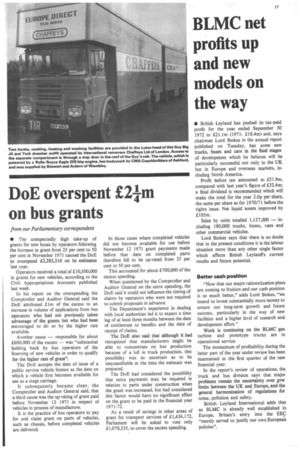DoE overspent Ellin on bus grants
Page 19

If you've noticed an error in this article please click here to report it so we can fix it.
from our Parliamentary correspondent
• The unexpectedly high take-up of grants for new buses by operators following the increase in grant from 25 per cent to 50 per cent in November 1971 caused the DoE to overspend £2,283,316 on its estimates last year.
Operators received a total of £10,500,000 in grants for new vehicles, according to the Civil Appropriations Accounts published last week.
In his report on the overspending the Comptroller and Auditor General said the DoE attributed £bn of the excess to an increase in volume of applications from bus operators who had not previously taken advantage of the grants but who had been encouraged to do so by the higher rate available.
Another cause — responsible for about £600,000 of the excess — was "substantial holding back by bus operators of the licensing of new vehicles in order to qualify for the higher rate of grant".
The DoE accepts the date of issue of a public service vehicle licence as the date on which a vehicle first becomes available for use as a stage carriage.
It subsequently became clear, the Comptroller and Auditor General said, that a third cause was the up-rating of grant paid before November 12 1971 in respect of vehicles in process of manufacture.
It is the practice of bus operators to pay for and claim grant on parts of vehicles, such as chassis, before completed vehicles are delivered. In those cases where completed vehicles did not become available for use before November 12 1971 grant payments made before that date on completed parts therefore fell to be up-rated from 25 per cent to 50 per cent.
This accounted for about £700,000 of the excess spending.
When questioned by the Comptroller and Auditor General on the extra spending, the DoE said it could not influence the timing of claims by operators who were not required to submit proposals in advance.
The Department's experience in dealing with local authorities led it to expect a time lag of at least three months between the date of entitlement to benefits and the date of receipt of claims.
The DoE also said that although it had recognized that manufacturers might be able to concentrate on bus production because of a lull in truck production, this possibility was so uncertain as to be unquantifiable at the time the estimate was prepared.
The DoE had considered the possibility that extra payments may be required in relation to parts under construction when the grant was increased, but had considered this factor would have no significant effect on the grant to be paid in the financial year 1971-72.
As a result of savings in other areas of grant for transport services of £1,436,172, Parliament will be asked to vote only £1,078,335, to cover the excess spending.












































































































